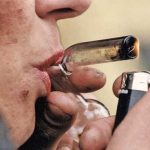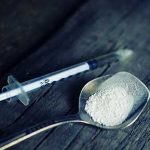Crack cocaine (or “crack”) is a stimulant drug that resembles a small, white rock. It consists of powdered cocaine mixed with ammonia or baking soda.
As an illegal drug, crack is sold on the street. Its price can vary widely.
How Much Does Crack Cocaine Cost?
Crack cocaine prices range between $18 and $200 per gram, with the average cost being about $60 per gram. The exact price depends on factors like location and purity.
Location
According to the United States Drug Enforcement Administration (DEA), about 90% of cocaine in the U.S. comes from Colombia. Thus, in general, the closer you are to Colombia, the cheaper crack cocaine will be.
Crack also tends to be cheaper in big cities, where higher supply leads to lower prices.
Purity
Some crack dealers mix the drug with adulterants to increase the drug’s weight and decrease production costs. Common adulterants include laundry detergent, boric acid, caffeine, and creatine.
These substances make the drug less expensive. In most cases, lower purity leads to lower prices.
The Cost Of Crack Cocaine Vs. Powder Cocaine
In general, crack cocaine costs less than the powder form of cocaine (which usually costs about $93 per gram). That’s because crack is less pure. It also contains more “hits” per gram, which means it requires less time and money to produce. This allows drug dealers to charge less for it.
The Cost Of Crack Addiction
The cost of a gram of crack might seem relatively cheap. However, because the drug is so powerful, even short-term crack use can lead to crack addiction. Crack addiction is a brain disease that makes you feel unable to stop using the drug even if you want to.
Other symptoms of crack addiction include:
- mood swings
- loss of motivation
- loss of interests in activities once enjoyed
- isolation from family and friends
- tolerance (needing increasingly larger or more frequent amounts of crack to feel the desired effects)
- physical dependence (developing withdrawal symptoms, such as nausea or shaking, when you don’t use crack)
Many people with crack addiction buy the drug every day, often spending around $80,000 per year on it.
Other potential costs of crack addiction include:
Damaged Relationships
In most cases, people use crack because it can cause pleasant effects like excitement, increased energy, and euphoria (intense joy). However, the drug may also make you anxious and paranoid (extremely mistrustful of others). Paranoia can lead to aggression, which seriously threatens your relationships with loved ones.
Job Loss
When you’re addicted to crack, you may find it difficult to focus on anything besides getting and using drugs. In addition, as mentioned above, crack addiction often causes loss of motivation.
That’s why many people with the disease fall behind at work, which can lead to job loss and financial difficulties.
Legal Troubles
Most people with crack addiction will do anything they can to get the drug, even if it means breaking the law. Common crimes associated with crack addiction include trespassing, theft, and assault.
These crimes can have serious consequences, including large fines and jail time. They may also hinder your ability to secure employment or housing.
Health Problems
Like other types of drug addiction, crack addiction poses a number of health risks, including:
- high blood pressure
- loss of appetite, extreme weight loss, and malnourishment
- psychosis (a loss of connection with reality that often includes hallucinations, delusions, and paranoia)
- stroke
- heart damage
- lung damage (from smoking crack)
In addition, people who use crack face a high risk of overdose. According to the National Institute on Drug Abuse, the most common symptoms of a crack overdose include anxiety, trouble breathing, and increased body temperature.
When left untreated, a crack overdose can lead to a heart attack, seizure, or stroke.
Crack Addiction Treatment Options
If you or someone you love struggles with crack cocaine addiction, seek help at a substance abuse treatment program. These programs provide personalized, recovery-focused services, such as mental health counseling, medical detox, and support groups.
To learn more about crack addiction treatment options, please contact Northeast Addictions Treatment Center. Our board-certified health care providers offer a variety of services to help you and your loved ones stay drug-free.
Sources
- National Institute on Drug Abuse — Cocaine DrugFacts
- National Institute on Drug Abuse — What are the long-term effects of cocaine use?
- United Nations Office on Drugs and Crime — Cocaine: Wholesale, street prices and purity levels
- United States Drug Enforcement Administration —- 2019 National Drug Threat Assessment
- United States National Library of Medicine — Cocaine
Written by
Northeast Addition Editorial Team
©2024 Northeast Addition Center | All Rights Reserved
This page does not provide medical advice.





